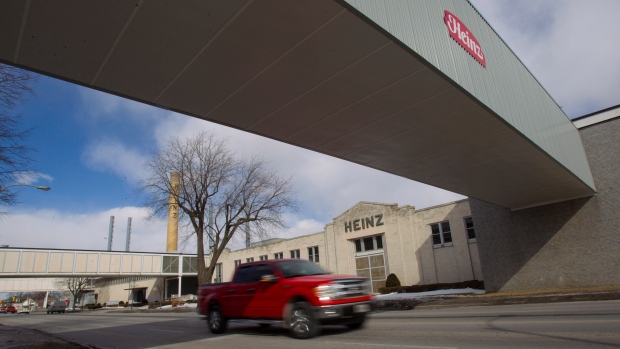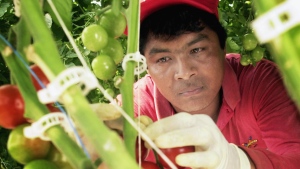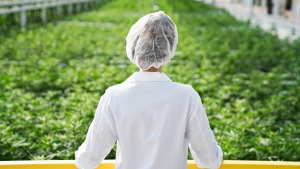Oct 12, 2018
How cannabis is transforming the Tomato Capital of Canada

For Cole Cacciavillani, his next biggest competitor isn’t Canopy Growth Corp. or Aurora Cannabis Inc. The co-founder of Leamington, Ont.-based Aphria Inc. says it could very well be in his own backyard.
“When Netscape first came out they were the big guys. Google was nowhere to be found,” Cacciavillani said in a phone interview with BNN Bloomberg, referring to the Internet’s early days in the 1990s. “And that’s the same thing I say about the cannabis space. I don’t know if our competitors are really, really here yet.
“From a commercial growing perspective, my competition is right in my backyard, they just haven’t woken up yet. Now they’re starting to wake up. There’s lots going on in Leamington.”
Aphria may be Leamington’s current leader of cannabis production, but Cacciavillani has one eye over his shoulder for good reason. Over the last 18 months in the lead-up to the legalization of marijuana in Canada, producers have flocked to Leamington – home of the largest concentration of greenhouses in North America – seeking to convert or construct facilities to build more capacity for pot.
Indeed, the fast-moving cannabis industry is giving the former home of Heinz’s ketchup plant new life, and its moniker of “Tomato Capital of Canada” a run for its money.

Located around Canada’s southernmost point, the Leamington and Kingsville area has one of the warmest climates in Canada. The town of 30,000 people has seen 21 of its approximately 120 greenhouse growers convert entirely to cannabis production or be acquired by a larger firm, according to James Cox, Leamington’s manager of economic development. Meanwhile, an additional 35 greenhouses are planning to add capacity to existing facilities to produce marijuana alongside crops like tomatoes, peppers and cucumbers.
Additionally, the area’s growers have the technical expertise to handle a highly-regulated agricultural sector like cannabis, according to Mike Dixon, environmental science professor and director of the Controlled Environment Systems Research Facility at the University of Guelph.
“This is not gum boots and garden hoses in a plastic greenhouse,” Dixon said.
“[Leamington has] serious technology in terms of computer automated, environmentally controlled, hydroponic systems, disinfection protocol – a long laundry list of horticultural practices for cucumbers, tomatoes and peppers. It’s a logical home for a new commodity that promises significantly larger margins than food or even ornamental [plants].”
That was something Aphria’s Cacciavillani saw in 2012, after Canada changed the regulatory framework around medical cannabis and paved the way for the plant to be grown commercially. At the time, Cacciavillani Farms was already the “oddball” of Leamington’s growers, Cacciavillani says, bucking the trend of growing fruits and vegetables for more vertically-integrated holiday plants, such as poinsettias and Easter lilies. He fully converted the greenhouses to grow cannabis in 2016.
- Here’s where Canadians can buy cannabis on Oct. 17
- Baggies, no more: What pot products will look like when they hit Canadian shelves
- Know your CBD from THC? The cannabis buzz words you need to learn
RELATED: CANNABIS CANADA
“When I first brought [cannabis] to the farm into the greenhouses we had a meeting with all the staff. We told them what we were doing, asked them to keep it quiet, and told them that we were 100 per cent legal and showed the staff all the regulatory documents,” Cacciavillani said.
“Unfortunately I had three or four of our good staff send resignations in that day. There was a real stigma attached to this six years back.”
Today, Cacciavillani has nothing to hide. After initially starting with about 14,000 square feet of greenhouse space, Aphria’s cannabis capacity now stands at nearly 2.5 million square feet following a deal with Double Diamond Farms, another major Leamington greenhouse, earlier this year.
For many farmers in Leamington, the deal was a wake-up call on how they could use their greenhouses and expertise to solely grow and supply marijuana without packaging or marketing the product as Aphria and other licensed producers do.
“My phone rang off the wall once we did the deal with Double Diamond. [Growers] were saying, ‘Hey, wait a minute, if these guys can get into it too, what am I missing here?’” Cacciavillani said.
“That is right in the wheelhouse of most of the growers in Leamington. Not only did the growers in Leamington wake up and start calling me, they also called all of our competitors to say, ‘Hey, if you guys want to do what Aphria did at Double Diamond, we’re here too.’”

In July, Toronto-based Cronos Group Inc. announced it will develop an 850,000 square-foot greenhouse with Mucci Farms in Kingsville.
Since 2015, the cannabis industry has added about 500 jobs to Leamington. The town forecasts cannabis-related employment will rise to approximately 1,250 jobs and account for approximately $200 million in new direct and spin-off economic activity.
The new era of marijuana has not only been “extremely positive” for employment, but also the broader economy, Leamington’s Mayor John Paterson says.
“What we hope will happen is we can attract the research and development industry to our municipality, as well as bringing in high-level scientific jobs. So economically, I think [the marijuana industry] will serve Leamington very, very well.”
But the impact the cannabis sector is bringing to the area isn’t being welcomed by everyone. Earlier this week, a Kingsville town council meeting drew hundreds of residents opposing proposals to convert a number of agricultural facilities to medical marijuana production sites. The residents raised concerns about cannabis odour issues and the locations’ proximity to housing, schools and sports fields.
Paterson stresses that becoming the “Cannabis Capital of Canada” has not been something the town has actively sought after.
“I think Leamington will always be known as the ‘Tomato Capital of Canada.’ Whether it’s field tomatoes or tomatoes coming out of greenhouses, we still produce tons of tomatoes,” Paterson said.
“‘Cannabis capital’ is possible … We have not chased after the industry. It’s chasing us.”
Cannabis Canada is BNN Bloomberg’s in-depth series exploring the stunning formation of the entirely new – and controversial – Canadian recreational marijuana industry. Read more from the special series here and subscribe to our Cannabis Canada newsletter to have the latest marijuana news delivered directly to your inbox every day.

